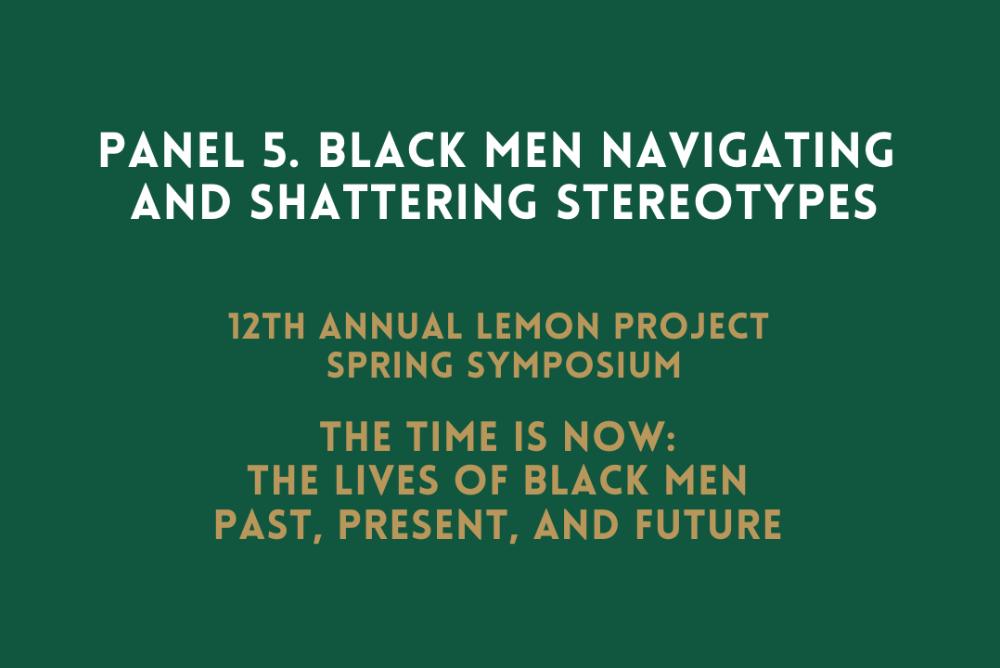W&M Featured Events
[PAST EVENT] 12th Annual Lemon Project Spring Symposium Panel 5. Black Men Navigating and Shattering Stereotypes
Location
School of Education, In person at Holly Room and Virtual over Zoom301 Monticello Ave
Williamsburg, VA 23185Map this location
Access & Features
- Free food
- Open to the public
- Registration/RSVP

Panel 5. Black Men Navigating and Shattering Stereotypes
12th Annual Lemon Project Spring Symposium
To join us in person, please register here.
To join us virtually, please register here.
Robert Monson Jr., (he, him) Professional Student, United Theological Seminary, Black Male Softness In A World Bent On Cruelty
Dr. Yolanda Pierce wrote a book entitled In My Grandmother's House: Black Women, Faith, and the Stories We Inherit. In it, she writes about the survival tactics that Black women pass on to young Black girls in order to survive. Although some of the tactics might be harsh, or legalistic at times, they have been deemed necessary. In similar fashion, many Black men have transmitted their own survival messages to the next generation of Black boys that they must be tough, quick-witted, and able to thrive in a world bent by cruelty. Softness and sensitivity are not known to be celebrated openly in many predominantly Black communities that have men at the center. While leaning upon the wisdom of generations gone by, this presentation will bridge the gap and highlight softness as both an ethic and an anchor for Black men as we seek to heal our communities. How can we move from simply surviving to thriving? How can we be more than what the media portrays of us daily? This presentation will reframe the word “soft” and give practical examples of how we as Black men can reclaim our softness. Soft is not weak.
Dr. Lynnette Stewart, (she, her) Assistant Professor, SUNY Empire State College, Black Manhood: Navigating Stereotypes
This paper offers insight into the impact of sociocultural images of Black men on definitions and expressions of manhood from the perspective of Black men. Using a m grounded theory analytical approach on semi-structured interview and focus group data, the results reveal a public performance of manhood purposely in opposition to popular constructions of Black masculinity. Interviewees paint a picture of masculine expression that contrasts and challenges stereotypical images of Black men as hypersexual, irresponsible, violent, flamboyant, uneducated, athlete, entertainer, and criminal. Participants negotiate stereotypes in the public and private spaces in dynamic and organic ways, at times rebelling against them, at times adopting them. This presentation explores each.
Alton Coston, III, (He, Him, His) Undergraduate Student, William & Mary, A Project of Self-Creation and Discovery through Black Autobiography: A Comparative Analysis between the Sociopolitical Development of Malcolm X and Myself
My summer research was dense as I simply engaged with a wide array of Black literature that has been instrumental in shaping my sociopolitical thinking. First, I read The Autobiography of Malcolm X by Alex Haley to ground myself in the primary source of my research endeavors. While reading the book, I identified certain experiences of relatability that Malcolm and myself shared. Following that, I reviewed Kenneth Mostern’s Autobiography and Black identity politics: racialization in twentieth-century America to analyze the literary strategies that made Malcolm X’s autobiography effective in showcasing his intellectual growth while still holding a captivating story. Lastly, I began to draft my autobiography drawing on the techniques that Kenneth Mostern discussed in his literature review. Studying Malcolm's autobiography has amplified qualities that I seek to hone in myself as a young man entering the political-legal realm — his recurring spurts of self-creation, the affirmative messages of unembellished self-respect and reliance, discipline, communal responsibility, solidarity, and uncompromising pursuit of truth and justice lit a furnace deep within my core. Ultimately, this is a project that analyzed my sociopolitical transformative experiences in comparison to Malcolm's.
Linda Quarles Arencibia, Community Member, Four Horsemen: Out of the Box and Into The Saddle
Is the myth of Black men as a monolith with a shared, certain destiny of doom and failure sustainable? It is. But only to the extent that certain histories remain unknown. To facilitate a dialogue that opens obscure chapters of American history, Four Horsemen Saddle looks at Black Equestrian history and asks:
What have P.T. Barnum, a horse in the Arabian night, and an enslaved country doctor in common?
How did Teddy Roosevelt and British Royalty become clients and fans of a formerly enslaved man?
How has a black man of humble beginnings become an icon in the elite world of Foxhunting?
How does a young man with braided hair, beat the odds of survival for one who looks like him, and not only survive but thrive on the back of a horse in arenas unfamiliar to most Black males?
Four Horsemen engages the narratives of four Black Equestrians who impacted equestrian space, while living in a progressively racist society. Four Horsemen examines common circumstances in the lives of these men and shared character traits that illumine the humanity of each. Their commonalities, paired with the unusual and diverse course taken by each challenges the tendency to bestow upon black men a collective, singular, and predetermined incapacity or defeat. What emerges instead are testimonies of determination which suggest a shared resiliency, perhaps born of common challenges.
Contact
[[setho2, Sarah Thomas]]
